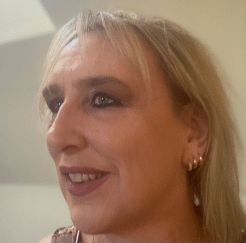Issue 1: Risk Management
Central register helps the financially weak in times of crisis

Interview
Helen Lord, CEO of the Vulnerability Registration Service
Helen Lord
“It’s absurd that the people with the biggest problems are the last to get help”
Aryza joined the UK Vulnerability Registration Service (VRS) in 2021. The non-profit organisation keeps vulnerable people on a central register. This information helps service providers identify and protect financially distressed or mentally ill people. VRS CEO Helen Lord talks about the association’s vision, plans and difficulties in this interview.

How many people are currently registered with VRS and how many could there be if you could reach all potentially vulnerable people?
There are currently 500,000 people registered with the VRS. Surveys suggest that around 26% of the population in the UK are vulnerable. That doesn’t necessarily mean that these people should all be registered with us.
In which sectors is the risk of vulnerability particularly high?
The focus these days is clearly on utilities. Many people are also affected by rising rents or mortgage payments. These are what we call priority bills. However, many of those affected do not know this and thus get into difficulties. Furthermore, rising energy bills also have an impact on other areas. So many people spiral into debt, currently fuelled by the effects of the pandemic and the cost-of-living crisis.
Is it in the self-interest of utilities to help vulnerable customers in order to reduce default rates?
Each utility currently has its own “Priority Service Register”. Vulnerable customers can register there. However, this data is not shared across utilities or even across sectors. That would be essential. Providers need to have a clear overview of their clients’ financial situation to be able to offer support to vulnerable people. Right now people who have difficulty communicating or are mentally distressed need to get in touch with their service providers on their own initiative. Often they end up in a hotline queue or get lost online. Recently, there have been numerous cases in the UK of people not receiving the energy vouchers promised by the government. This has affected those who bill for their energy through so-called prepayment meters, which is particularly expensive. It is absurd that the people with the biggest problems are the last to get help.
Does the age of those affected play a role? Conceivably younger people might have problems with their mobile phone bills?
For many young people, the mobile phone is certainly essential in their daily lives and the last thing they want to do without. What we are seeing is that young people are more willing to admit to being vulnerable. For older people, it is still more of a stigma to admit to having mental health difficulties. A second factor is that young people are much more likely to use digital channels to make their presence felt. Digital exclusion is one of the biggest problems we face.
How do you reach these people?
Organisations or relatives register affected people with us, for example, with legal power of attorney. As VRS, we validate these cases with the Office of the Public Guardian. But for affected persons this is first of all a cost factor. Service providers who have a business relationship with potentially affected people should also think about the way they communicate and how they can reach as many people as possible.

There are different ways to get into trouble: mental health problems, financial abuse, you can become a victim of fraud …
Exactly, and there are correlations. We are now seeing an increase in people with mental health problems, which in turn often correlates with financial difficulties. That’s why we work with organisations and partners from different sectors, for example the Illegal Money Lending Team, which helps victims of coercion. People who fall outside the scope of regulated loans are exposed to great risks. Financial abuse through domestic violence is another issue. Here, too, we work with charities that are in direct contact with victims. One problem is that while data is collected on the causes, the context is disregarded. The VRS is trying to close this gap with its database. But we are still at the beginning.
The connection to the VRS is done via an interface, right?
Yes, the integration is very simple. The API can basically be docked at any point within the consumer journey. Vulnerability can play just as much a role in the application process as it does in customer service or collections. We are working across sectors with small and large companies that use the service in very different ways. We started with financial services and have added energy providers, online gambling operators, insurance companies, housing companies, local authorities. If someone is vulnerable, that is relevant for all sectors. Although, We still haven’t integrated nearly as many organisations as I would like.
Data protection and the GDPR are a big issue in many countries. What data does the VRS collect?
Are there organisations like the VRS in other countries?
Social responsibility – important also in the ESG context – and regulatory expectations are becoming increasingly important. Will this trend intensify?
Aryza joined the VRS to help its consumer credit customers better identify vulnerabilities and support customers.
The VRS is the first central database for vulnerable people in the UK and provides a free central place for people to register their protection status. Financially vulnerable people include those in financial distress, with mental health problems, at risk of financial abuse, victims of fraud and their representatives, such as agents.
The integration will allow all lenders using Aryza Sentinel to support their loan applications to automatically cross-check against the VRS database. Should a vulnerable customer apply for credit, the system will automatically flag their status during the origination process, including for customers at risk of fraud.
Paul O’Sullivan, CEO Aryza Lending Division, said, “By integrating with VRS, we can provide an additional layer of protection to both lenders and consumers – especially at a time when lenders are looking for new and more efficient ways to keep up with regulatory changes. Not only will this improve operational efficiency for the more than 200 companies already using Aryza Lend, but it will also allow them to better identify vulnerabilities and take the most appropriate steps in their underwriting process to achieve the best possible outcome.”
Go back to the Perspective Magazine homepage
Be the first to read our next issue – sign up to our newsletter here
"*" indicates required fields